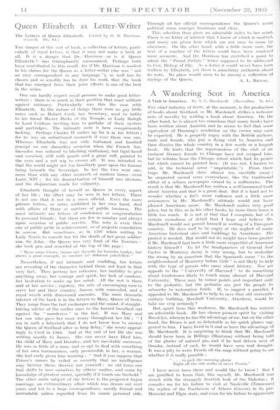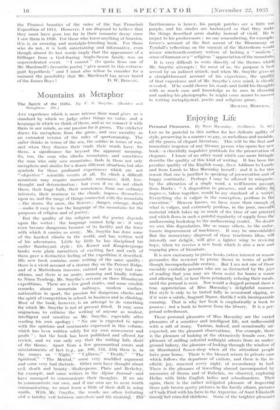A Wandering Scot in America
A Visit to America. 13y A. C. Maudonell. (Macmillan. 7s. Ca.) THE chief industry of Scots, at the moment, is the production of books about Scotland, so Mr. Macdonell strikes a welcoMe
note of novelty by Writing a book about America. On the
other hand, he is almost too conscious that many books have been written about. Anierica and he seems to feel that some equivalent of Dunning's resolution on the crown may soon be expected. lie is properly angry with the British authors, male and female, who pay a flying visit to America and then dismiss the whole country in a few words or a longish book. He hints that the repercussions of the visit of au eminent literary female to Chicago have not escaped him, but he refrains from the Chicago retort which had its points.
but which cannot be Printed here. (It was not, I hasten to add, in the technical sense " unprintable.") Front these traps Mr. Macdonell shies almost too carefully away ; he suspected sacred cows everywhere, like the traditional editor of, a reform newspaper owned by a millionaire. The result is that Mr. Macdonell has written a well:Mannered book about Anierica and that is a great deal. 13ut it is hard not to wonder whether a IWO:: more rudeness and a little more seriousness in Mr. Macdonell's attitude would not have pleased Americans more. Mr. Macdonell makes very good jokes, but in this, as in his other books, he rams them home a little too much. It is not of that that I complain, but of as certain casualness of detail that I hope and believe Mr.
Maedonell would not permit himself in writing of a European country. He does well to be angry at the neglect of many
American historical sites and buildings by Americans. His
protest is needed. But would not its weight have been greater if Mr. Maedonell had been a little more respectful of American history himself ? To let the headquarters of General Jose Castro in Monterey decay is very Wrong, but to underline the wrong by an assertion that the Spaniards came " to the
neighbourhood of Monterey before 1550 " is not likely to heir/ with the type of person who cares about history. Nor are appeals to the " University of Harvard " to do something about tombstones likely to touch many alumni of Harvard.
University. These may be minor points and important only to the pedantic, but the pedantic are, just the people to subscribe to restoration funds. to suggest a parallel, I appealed to Mr. Macdonell to help to save that old sixteenth- century building, Marshall University, Aberdeen, would he take me very seriously ?
But, apart from this weakness, Mr. Macdonell has written an admirable book, He has shown pioneer spirit by visiting Brooklyn, wherein helms the advantage of me, but on the other hand, the Bronx is not so detestable as his quick glance sug-, gesterl to hint. I haVe lived in it and so have the advantage of Mr.' Macdoneli. it is surprising to think that M. Maedonell
should have been in Billings (Montana) without being told of the glories of natural gas, and if he had driven west of Omaha, instead of east, he would haVe seen real drought. it was a pity to write Peoria off the map without going to see whether it is really possible , to pick the morning gloria
Right off the aide-walks of swoot Peoria."
• I have' never been there and would like to know l But I am gratified to learn that, like myself, Mr. Macdonell was struck with the strangely Scottish look of the Dakotas ; it consoles me for his failure to visit at Nashville (Tennessee) the replica of the Parthenon of Athens (Greece) in its pre- Morosinf and Elgin state, and even for his failure to appreciate the Piranesi beauties of the ruins- of the an Franatsai ExPosition of 1915. However, I am disposed to believe that they must have gone too far in their romantic decay since I saw them in 1926. For those who know anything of America, this is an amusing and nostalgia-breeding book. For those who do not, it is both entertaining and informative, even thciugh almost its last words imply that the appearance of a Dillinger from a God-fearing Anglo-Saxon family was an
unprecedented event. I cannot " (to quote from one of Mr. Macdonell's favourite poets) ""give assent to this extrava- gant hypothesis " and I must alSo refuse to consider for 'a moment the possibility that Mr. Maedonell has never heard































































































 Previous page
Previous page